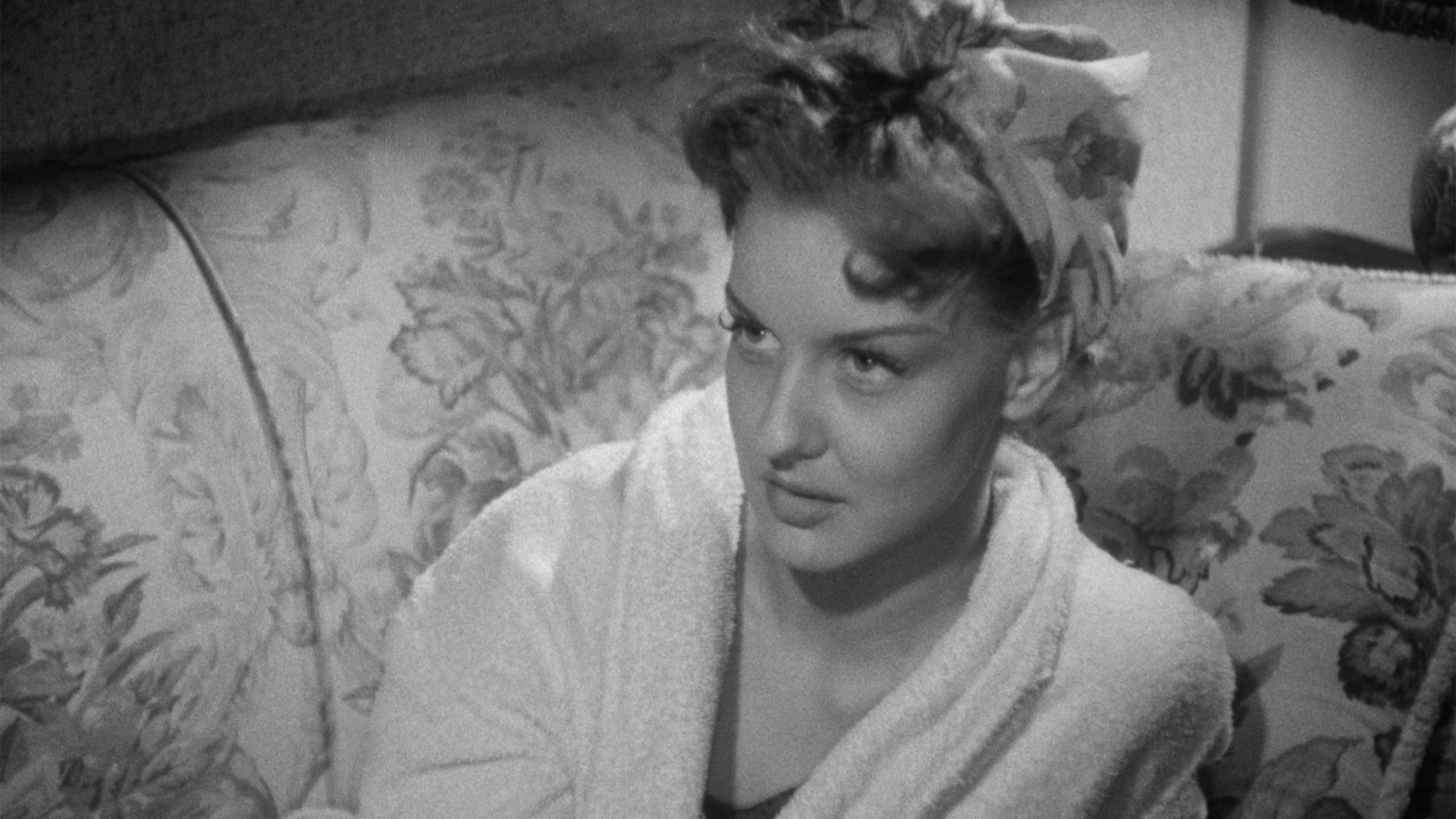RELATED ARTICLE
What’s in a Name
The Criterion Collection

“The world is full of skeptics,” Detour’s Al Roberts struggles to explain, in voice-over, while on-screen we’re pondering Vera’s dead body. “I know. I’m one myself . . .”
Even now, closing in on seventy-five years after the Producers Releasing Corporation (PRC) introduced the film to that world of skeptics in 1945, and nearly three decades after its admission in 1992 to the National Film Registry of the Library of Congress; after all the inspired critical validation—notably by John Belton, James Naremore, Andrew Britton, Dana Polan, and Greil Marcus—and all the scrupulous cinematic homages, by the likes of David Lynch, the Coen brothers, Guy Maddin, and Christopher Smith; and even after the theatrical premiere of this overdue 4K restoration in 2018, Detour is still, as Winston Churchill wisecracked of Russia, “a riddle wrapped in a mystery inside an enigma.”
From the moment I first saw Detour in Boston during the early eighties on, I swear, a ten-inch student TV, I’ve believed Edgar G. Ulmer’s mix of squalor and artistry to be the smartest, subtlest, and most slinkily disorienting B movie ever made, a touchstone of film noir, and a rare instance of the sideline or underhand cultural astonishments that Manny Farber tagged “termite art,” which, as he proposed in “White Elephant Art vs. Termite Art” (1962), “goes always forward eating its own boundaries, and, likely as not, leaves nothing in its path other than the signs of eager, industrious, unkempt activity.” I also remember thinking that, as pianist/hitchhiker Roberts (Tom Neal) tries to alibi his way past the deaths of Charles Haskell Jr. (Edmund MacDonald), the showy gambler who gives him a ride in Arizona, and the sour, corrosive Vera (Ann Savage), Detour looked like the canniest adaptation imaginable of the kinds of novels Jim Thompson would start to write a few years down the line—The Killer Inside Me (1952), Savage Night (1953), A Hell of a Woman (1954), and Pop. 1280 (1964): those fever dreams of edgy, disturbed white males who unravel into murder, their voices alternately swaggering and shrinking, evasive and self-deceiving, their reeling denials tantamount to confessions.
Such a film shouldn’t—almost couldn’t—exist, despite Ulmer’s surprising triumphs across divergent movie genres, nations, languages, and studios. Born in 1904, in what is now the Czech Republic, Ulmer was raised in Vienna, and his career eventually carried him from Berlin to New York to Hollywood and back and forth again. Ulmer’s dizzying farrago of a filmography could almost be described as encompassing in miniature the range of possibilities and predicaments for a Western director in the European and American twentieth century. People on Sunday, a brilliant 1930 silent reconnaissance of Berlin life, which Ulmer made in collaboration with Robert Siodmak, Billy Wilder, Fred Zinnemann, and Eugen Schüfftan, and The Black Cat, a stylish, atmospheric 1934 thriller he made for Universal, ultimately led to “ethnic” features—Ukrainian, Yiddish, African American—and the Poverty Row of PRC. Ulmer died in Woodland Hills, Los Angeles, in 1972. His other cinematic detours, directorial and otherwise, lurched from The Border Sheriff (1926), Natalka Poltavka (1937), Green Fields (1937), and Moon over Harlem (1939) through Bluebeard (1944), Strange Illusion (1945), Carnegie Hall (1947), and Ruthless (1948), on to The Man from Planet X (1951), Murder Is My Beat (1955), Daughter of Dr. Jekyll (1957), and The Amazing Transparent Man (1960), to summon only a few conspicuous Ulmer wonders, at least some of these sophisticated, personal pictures accomplished on preposterously tight budgets and schedules.
“Not only shouldn’t Detour exist, it almost didn’t.”
His parallel weakness for dubiously self-aggrandizing credits—The Golem, which premiered in 1920, when he was just sixteen; precocious, high-level collaborations with Max Reinhardt and F. W. Murnau—only made the circumstances around Detour sound even more absurd, or a miracle. Back in the 1980s, depending on which fan was tallying the estimations, the movie was earnestly reputed to have cost $60,000, $30,000, or $20,000, over six, five, or three days. And I heard speculation that maybe Edgar G. Ulmer didn’t really create his masterwork—as cineastes like Pierre Rissient intoned ominously, “You know, of course, Ulmer didn’t direct Detour.”
So when, in the late nineties, obsessed with the film, I eventually flew to Madison, Wisconsin, to research the PRC budget, the oddest wrinkle waiting for me wasn’t so much evidence of the actual fourteen camera days on set, or the $117,226.80 final sum, as it was the disclosure casually reposited inside the ledgers that two directors had pocketed paychecks for Detour. Under the subhead “Director and Co-Director,” one L. Landers received $3,000, while E. Ulmer earned only $750. When soon after I met Ann Savage, she showed me her original shooting script over dinner at Musso & Frank Grill, in Hollywood. There on the title page, after the date of May 24, 1945, just one man appears as the director of Detour: Lew Landers. That the notoriously unreliable Ulmer might not have directed Detour, his signature unreliable-narrator film noir classic, seemed so ridiculously apt and resonant you almost yearned for it to be true.
Yet, as Andrew Sarris once quipped, “Yes, Virginia, there is an Edgar G. Ulmer.” And as I came to know Ann, and she recounted her experiences with the director on set, and then as I shadowed a train of documents—the 1939 Martin M. Goldsmith source novel, Detour: An Extraordinary Tale, and a lost 1944 Goldsmith film treatment; some letters, some synopses, and a cast list from the Production Code Administration files; the PRC budget; Savage’s script—I discovered that not only shouldn’t Detour exist, it almost didn’t. The materials of the film found a distinctive shape—the slippery, beguiling, disturbing shape we now take for granted—only late in the creative process, and the inescapable inference was that Ulmer had devised the film we celebrate as Detour during the shooting and editing. If Ulmer had merely adapted the novel, or stuck to Goldsmith’s screenplay, Detour would likely have disappeared into the hodgepodge of his filmography.

